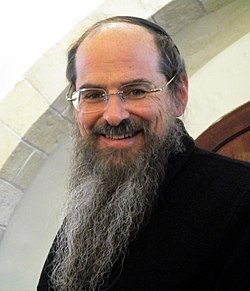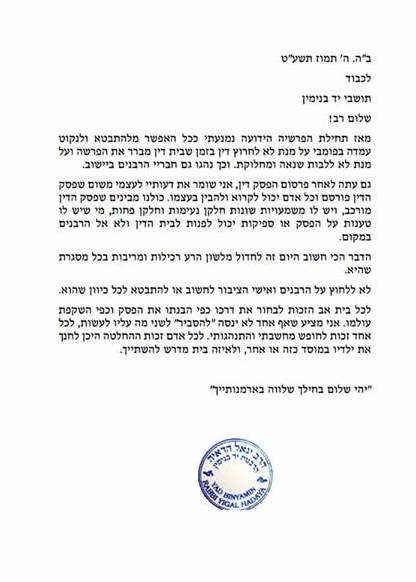
Rabbi Shmuel Tal, whose yeshiva was originally located in Gush Katif in the Gaza Strip, attempted to form a “pure” community in the new Israeli town of Yad Binyamin. But then Rabbi Tal tried to convince at least one married woman to leave her husband, claiming that she and Tal were the reincarnation of Bathsheba and King David.
Yerachmiel Lopin summarizes the events in his blog Frum Follies:
Rabbi Shmuel Tal had a scam. As head of Torat HaChaim yeshiva as well as several other religious institutions in the central Israeli town of Yad Binyamin he went around claiming ruach hakodesh (Divine or prophetic inspiration). Tal counseled a young married woman to get a divorce from her husband in order to marry him. Tal claimed he knew through ruach hakodesh that Yifat, his wife, would die shortly. He also claimed to know through ruach hakodesh that he was the reincarnation of King David and she was the reincarnation of Batsheba.
The woman got the divorce but the quite healthy wife didn’t die on the predicted date. Tal now tried to get his wife, Yifat, to agree to him taking this woman as a second wife but she refused this polygamous offer. So Tal ignored the woman.
Realizing she had been taken, she remarried her husband. They both sued R. Tal for damages and got a hefty award (500,000 Shekels/$140,000) and Tal made a first partial payment toward the total. Based on that settlement, Rabbi Shmuel Eliyahu ruled that Tal had repented and could continue leading his yeshiva and other institutions. This all happened about 4 years ago and the public was left in the dark about this shady, manipulative, cultic, marriage-wrecking rabbi.
Please visit Frum Follies to get the whole story, including analyses by the blogger Yerachmiel Lopin and by Rabbi Yosef Blau, Mashgiach Ruchani (spiritual advisor) at Yeshiva University’s rabbinical seminary and long time anti-abuse activist.
Today, Rabbi Blau published his thoughts in a blog post, Rabbi Shmuel Tal’s authority is intact. Everyone should be asking why. He writes:
As an outsider to the community, but as one who has been informed that Rabbi Tal’s authority in his community is absolute, a claim of teshuva that does not change the fact that the community’s internal dynamic is questionable.
We have received more hints about the dynamics of the community from two responses after a rabbinic court recently ruled that Tal could maintain his position as rosh yeshiva.
The first, by state-appointed rabbi of the community Yigal Hadaya, includes his official stamp:

Rabbi Hadaya writes:
My rabbinic friends and I have refrained from commenting on this case.
I waited until the rabbinical court issued its ruling as I didn’t want to comment while it was going on.
Even now that it’s been published, I am keeping my opinion to myself because anyone can see it and read it for themselves, and we all understand that it’s complex. It has various implications, some are more pleasant and some less. Whoever has gripes about the ruling, or doubts, may approach the rabbinic court directly and not the local rabbis.
Today, the most important thing [emphasis mine] is to stop lashon hara (evil speech), slander and fighting in any framework.
Don’t pressure rabbis or public figures to respond or speak out in any way.
Every beit din has the right to choose its way, according to its understanding of the ruling, and its worldview. I suggest that no one try to “explain” to another what he should do. Everyone has the right to independent thought and behavior. Everyone has the right to decide how to educate his children whether in one type of institution or another, and with which beit midrash to affiliate.
[Signed with stamp of Rabbi Yigal Hadaya]
In other words, we want everyone to keep their opinions to themselves because if you don’t, he suggests, some of the community’s sheep might realize that they have been manipulated. Anytime you need to control people by stopping discussion, it is too late. The barn door can’t be closed.
Journalist Avishai Grinzaig, a journalist at Maariv, posted an anonymous letter from a resident of Yad Binyamin. The author, who is about to leave the community after twelve years, wrote about his pain over being slandered and ostracized because he had expressed concerns about Rabbi Tal. When he first heard the allegations, he had kept quiet, assuming that this sensitive matter would be taken care of appropriately.
But once it became clear that he did not support Rabbi Tal, the resident wrote, his family was ostracized despite having given “hundreds of thousands of shekalim” to the community’s institutions. His wife, who was employed by the women’s seminary, had always been praised for her work. Yet she stopped being invited to her students’ weddings.
The resident concludes by saying:
Perhaps the community will start to think about why over so many years, so many people are hurt and were harmed by the community and its institutions? Why are there so many bitter employees? We need to ask forgiveness from all of those who lost emunat chachamim (faith in the sages) like I did, along with my ostracized friends.
The rabbinic court did not see fit to address the ostracizing and the excommunications, the disputes and the slander, the active and passive pressure, and the blood that has been spilled in the streets of my, my wife’s and my friends’ Yad Binyamin. The repentance was only for the divine spirit [that Tal claimed to have], not for the derech eretz that was missed in a big way.
The truth is that for us, it doesn’t matter. My wife and I are leaving the holy community of Torat HaChaim. We are going to a community that knows that if there isn’t any “between man and man,” there is also no “between man and God.” That prohibiting ostracism and excommunication comes before skirt length, that slander and love of one another comes before kashrut standards.
I love you and judge you all favorably. I nevertheless think that we missed the mark in a big way.
[…] there were also posts by Rabbi Blau in the Times of Israel and by Hannah Katsman on her blog, A Mother in Israel. All of us utterly dispute the claim that he […]